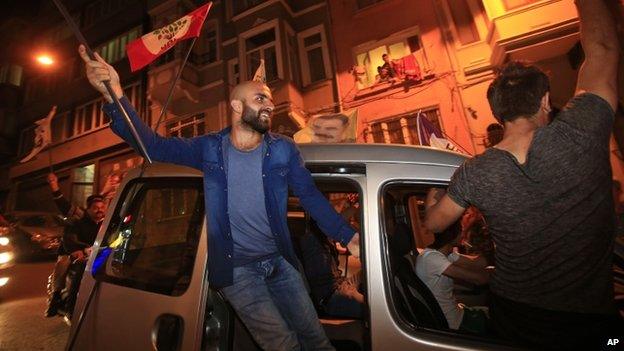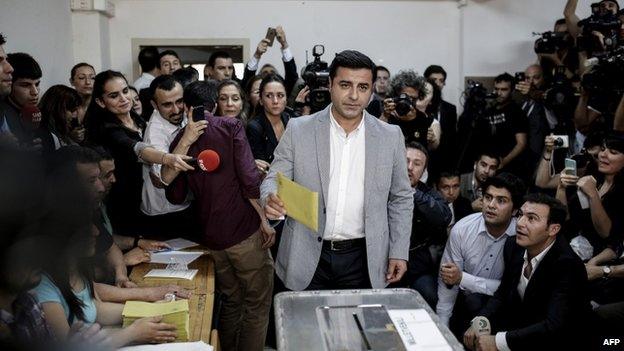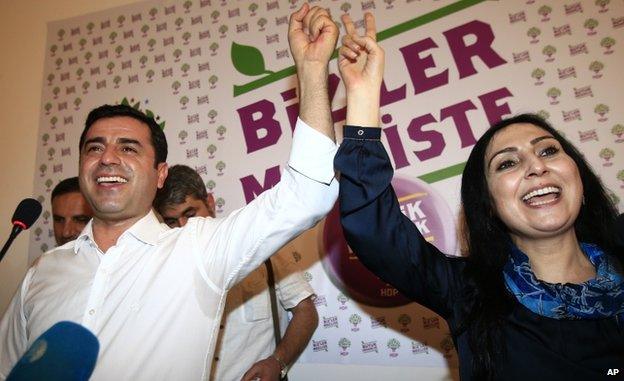Turkey's HDP challenges Erdogan and goes mainstream
- Published

The HDP's success was celebrated in Kurdish cities but it made inroads in western Turkey, too
It was never totally accurate to label Turkey's People's Democracy Party (HDP) simply as pro-Kurdish, as they were never a single issue party.
It is even less appropriate now that the party has secured the necessary 10% of the vote to enter parliament, extending its appeal to leftists, liberals, environmentalists, gay rights activists and pious Muslims.
"Kurdish-Turkish, left-wing opposition party" might be a better description of what it stands for, if a little more unwieldy.

Broader appeal

The HDP increased its support in Turkey's biggest city, Istanbul
It was not long ago that anybody vaguely associated with the Kurdish movement, which included the Kurdistan Workers' Party (PKK), used to be regarded as supporting "terrorism".
Despite being part of the Kurdish movement in Turkey, the HDP has managed to appeal to ordinary Turks, whose vote in western Turkey was crucial in helping the party pass the 10% national election threshold for entering parliament.
Until now, the party's candidates ran as independents in Kurdish-majority areas as the threshold does not apply to independent candidates. But now it has won twice as many seats as a national party.
It did not change its moderate message throughout the election, despite dozens of attacks against party supporters and offices, which culminated in a deadly attack on its largest election rally in Diyarbakir two days before the vote.
This message helped secure the support of some Turkish voters who may previously have had reservations towards the HDP.

Charismatic leadership

HDP co-chair Selahattin Demirtas was instrumental in the party's move to the mainstream
For the first time, the HDP has MPs in largely secular western cities such as Izmir, Antalya and Bursa, and it has increased its number of MPs in Istanbul.
Behind the HDP's dramatic rise is its charismatic co-chair, Selahattin Demirtas, a 42-year-old human rights lawyer who studied in the mainly Kurdish city of Diyarbakir.
He played a very visible role in changing mainstream attitudes towards the party.
As negotiations between the Turkish government and Kurdish rebels continued, Mr Demirtas also benefited from a relatively peaceful political atmosphere regarding the Kurdish question.
While the HDP took on the role of mediator between the government and the PKK, it is not the rebel group's political wing.
Mr Demirtas also adopted a left-wing stance on a number of issues that resonated with Turks in western Turkey.
The first hint that his party was becoming more mainstream was when Mr Demirtas won almost 10% of the vote in last year's presidential election, won by Recep Tayyip Erdogan.

Women, liberals and pious Muslims

The HDP's Selahattin Demirtas shares leadership of the party with Figen Yuksekdag (R)
Because the party requires equal representation of women for any candidacy, he shares the leadership with Figen Yuksekdag.
In the new parliament, 40% of its MPs will be women.
Until now, President Erdogan and his AK Party have found ways of challenging Turkey's secular nationalists by attracting liberal and progressive votes.
This time, many of those votes went to the HDP.
And by championing freedoms for all religious groups, it appealed at the same time to pious Muslim voters, too.